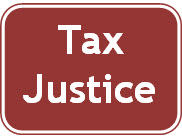
From the Guardian editorial page this morning, unapologetically in full:
Quibble, if you must, with the tactics and the arguments of the protesters who besieged branches of Vodafone this weekend, and shut down the giant Topshop on London's Oxford Street last Saturday. But give the UK Uncut demonstrators credit for this: instead of taking cheap shots at David Cameron, they are making a tricky, worthwhile argument about tax.
The reason protesters have gone after Topshop boss Sir Philip Green is because he advises the government on how better to spend its tax revenues, while arranging his affairs to avoid paying as much tax as he might. Five years ago, he banked a £1.2bn dividend from the Arcadia group that owns Topshop and others — and the money went to his wife, who, handily enough, lives in Monaco. Nothing illegal in that, but equally a lot of ordinary taxpayers may ask why someone who goes in for such schemes should advise ministers on issues of how tax money is spent. Similarly, Vodafone has faced accusations from activists who claim it has strong-armed Her Majesty's Revenue and Customs (HMRC) into accepting a tax payment some £6bn less than it is rightfully owed.
Consider what these protests tell you about the argument over tax justice. Vodafone disputes protesters' claims, and yet its executives privately acknowledge that they do not expect the demonstrations to go away any time soon. A technical argument over how much a multinational should pay to the British taxman may now be affecting Vodafone's business (you try buying a BlackBerry during a store sit-in) and has worked its way into the political debate.
Certainly, all this poses a direct challenge to the coalition. George Osborne has long calculated that the public would prefer eye-watering spending cuts over big rises in tax; which is why, in the coming fiscal consolidation, public spending will be reduced by £4 for every £1 put on tax. That political calculation may have appeared convincing six months ago; it looks less so now. Last week the government was jolted into bringing forward its plans for a general anti-avoidance principle, which could mean companies running their tax avoidance plans by HMRC before charging ahead.
Whether right or left, politicians typically assume that businesses always hanker after lower taxes. Yet small firms often want the opposite things from multinationals, and the interests of the finance industry do not reflect all of British business. So much was proved yesterday when the new CBI boss, Roger Carr, gave his support to the 50p super income tax introduced by Labour. The full effects of the past few weeks' protests are not yet apparent; but it looks likely that they have at least put tax justice back on the Westminster agenda. Which is where it belongs.
I’m not arguing with that.
Thanks for reading this post.
You can share this post on social media of your choice by clicking these icons:
You can subscribe to this blog's daily email here.
And if you would like to support this blog you can, here:


